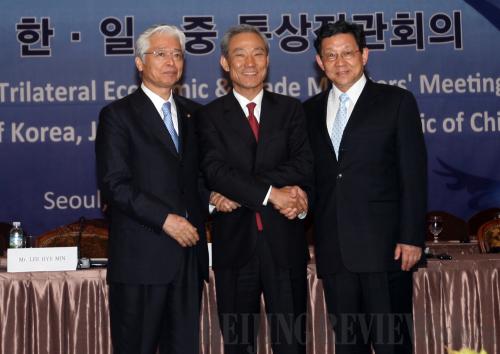|
 |
|
FIRM HANDSHAKES: Chinese Minister of Commerce Chen Deming (right), South Korean Trade Minister Kim Jong Hoon (center) and Japanese Economy, Trade and Industry Minister Masayuki Naoshima greet each other before the Seventh Trilateral Economic and Trade Ministers' Meeting in Seoul on May 23 (HE LULU) | The second is substantial progress in the six-party talks in promoting the denuclearization of the Korean Peninsula, which would in turn help develop a peace mechanism for the Peninsula.
The most urgent problem presently is to prevent new tensions caused by the sinking of South Korea's naval ship Cheonan, which South Korea blames on North Korea. Meanwhile, the six-party talks should be resumed as soon as possible.
The third condition is the formulation of appropriate state norms, mutual confidence building measures and international crisis management mechanisms by the East Asia Security Community.
Further, all participating countries should enjoy equal sovereignty. They should comply with the norms of the future East Asia Community and never put national or bilateral military alliances above the multilateral security mechanisms of the region.
The final, but not least, condition is the East Asia Security Community must go beyond different social systems and ideologies, and safeguard the common security interests of all to the maximum.
It is difficult for future East Asia security cooperation to exclude U.S. participation. China does not object to the United States' participation in security issues in East Asia. What it objects to is the United States and its allies' interference in the Taiwan question, in China's internal affairs by exploiting so-called human rights issues, and in China's territorial and maritime rights and interests disputes with neighboring Asian countries.
In these regards, it should be made clear the purpose of building an East Asia Security Community is to seek common and sustainable security through peaceful multilateralism.
Sustainable security is as important as sustainable development. It aims to ensure security that is comprehensive and enduring, relatively inexpensively.
The focus can be divided into two—traditional and nontraditional security.
With traditional security, countries seek lasting regional peace through multilateralism. Peaceful multilateralism advocates countries involved should not resort to force or threaten resorting to force against each other. Neither should they use or threaten to use force against countries besides the parties involved. It insists international disputes be settled through dialogue and cooperation.
In addition, consideration should be given to building a nuclear-free zone in Southeast Asia and Northeast Asia. This is also a goal of the East Asia Security Community. Nuclear states should promise not to use nuclear weapons against states in the region with no nuclear weapons, and promise non-first use of nuclear weapons against each other.
In non-traditional terms, countries involved can strengthen cooperation on transnational security issues including combating terrorism, smuggling, drug trafficking and piracy, preventing cross-border infectious diseases and protecting the environment.
This kind of cooperation will help strengthen mutual trust, prevent an arms race, reduce security costs, enhance its quality, and ensure sustainable common security.
Further, a new geostrategic concept—peace and cooperation between "land powers" and "sea powers"—should be established. This concept advocates peace and cooperation between maritime states and continental states. It calls on them to manage properly and make good use of geopolitical relations with peaceful means, thus promoting sustainable peace, security, development and prosperity in East Asia.
East Asia is composed of land-locked, maritime and peninsula countries as well as islands and countries occupying both land and sea. Therefore, although they are close neighbors, complex checks and balances do exist in terms of geopolitics.
Without peace and cooperation between maritime and land-locked countries, there will never be an East Asia Community. The only way is to transcend geopolitics to strengthen regional cooperation by making use of geo-economic advantages.
A basic framework
While strengthening trilateral cooperation, China, Japan and South Korea should continue to support ASEAN in taking the initiative and establishing an East Asia Core Community with "ASEAN Plus Three" as its main body.
In this way, a multilateral regional cooperation system characterized by diversity, coexistence and mutual complementarities, will be formed in East Asia, oriented toward the whole of Asia and the Asia Pacific region.
Since the 1980s, people have drawn two basic conclusions about the establishment and development of Asia-Pacific economic cooperation and multilateral security dialogue mechanisms.
The first is the establishment of a multilateral cooperation system needs to be based on robust bilateral relations. The second is it will produce better results to allow small and medium-sized countries to sit in the driver's seat, rather than one or a few large countries dominating.
Since ASEAN nations serve as the glue binding the region's large countries together, the "ASEAN Plus Three" mechanism has become the foundation of the future East Asia Community.
The author is a professor of the Institute of International Studies at Tsinghua University | 